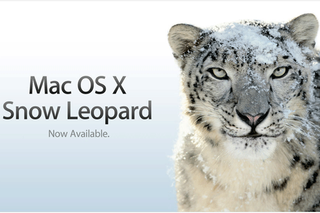Apple OS X Snow Leopard review: first look
Apple's Snow Leopard is a major overhaul, but also feature light. We take a look to see if it's worth the £25 sticker price.

As operating system releases go, Apple's Snow Leopard is a tricky one to judge. On one hand it can be viewed as offering a disappointing smattering of improvements, but it also falls into the major rewrite' camp.
The reason for this is simply because Snow Leopard doesn't offer a long list of headline enhancements, but rather most of the good work has been done stealthily, under the hood.
Let's talk about two of those enhancements. Firstly, there's the not insignificant fact that all major applications have been written to be natively 64-bit. Intel processors in Macs have always been natively 64-bit, but with much of the software not optimised for it this offered limited benefit.
Now however, Apple has rewritten all of the major applications inside Snow Leopard to be fully 64-bit. This includes the Finder, Spotlight, and Safari browser, so if you thought those searches and the Javascript performance were fast before, they will be even faster now. What's more, the memory limit goes up from 4GB of memory, to 16 billion, which should be enough for anyone, at least for a couple of years.
Additionally, 64-bit computing offers more scope for security features such as Execute Disable Bit.
Hand in hand with this is another purely under the hood feature in the guise of Grand Central Dispatch. A typically Apple name, it's actually a pretty good descriptor of what this system service does it manages the transactions of software threads between processor cores. We all know that multiple cores makes sense, and that adding more cores gives you far great potential performance increase at a particular power consumption compared to trying to boost a single core. But getting that performance out of the apps is difficult.
Apple says the Grand Central Dispatch will make it easier for developers to create multi-threaded aware applications that will therefore take advantage of those extra cores. Macbooks only have two cores now, but there are eight in the desktop Xeon Mac Pros, and it won't be too long before quad-core comes to laptops. However, developers will still have to learn to use Grand Central Dispatch, so it's something that means your Mac will get faster over time, as future applications are written using it.
Get the ITPro. daily newsletter
Receive our latest news, industry updates, featured resources and more. Sign up today to receive our FREE report on AI cyber crime & security - newly updated for 2024.
Benny Har-Even is a twenty-year stalwart of technology journalism who is passionate about all areas of the industry, but telecoms and mobile and home entertainment are among his chief interests. He has written for many of the leading tech publications in the UK, such as PC Pro and Wired, and previously held the position of technology editor at ITPro before regularly contributing as a freelancer.
Known affectionately as a ‘geek’ to his friends, his passion has seen him land opportunities to speak about technology on BBC television broadcasts, as well as a number of speaking engagements at industry events.





